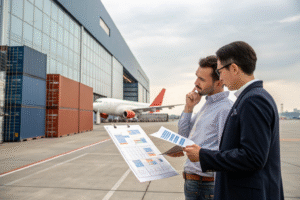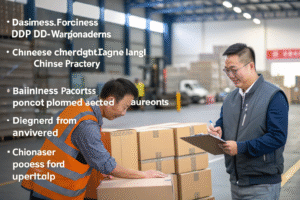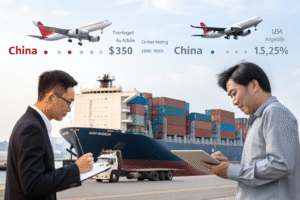E-commerce is one of the fastest-growing industries in the world, and brands that source products from China rely heavily on efficient logistics. Yet, many companies struggle with unreliable shipping partners, hidden costs, and delays at customs. As an experienced freight forwarder, I know that finding the right partner in China can make the difference between scaling smoothly and losing customer trust.
Yes, China is home to several top freight forwarding companies that specialize in e-commerce logistics. They offer services like DDP, Amazon FBA shipping, customs clearance, warehousing, and last-mile delivery tailored for global online sellers.
Having worked with e-commerce clients across North America and Europe, I’ve seen how the right logistics partner transforms supply chains. Whether it’s ensuring fast customs clearance, negotiating competitive rates, or managing door-to-door delivery, professional freight forwarders are the backbone of successful e-commerce operations.
Why Do E-commerce Brands Need Specialized Freight Forwarders?
E-commerce logistics is different from traditional freight. Online brands often face smaller shipment sizes, tighter delivery deadlines, and strict compliance rules from platforms like Amazon.
Specialized freight forwarders for e-commerce manage DDP services, customs brokerage, and direct delivery to fulfillment centers like Amazon FBA, ensuring smooth and affordable shipping.

Why is DDP service critical for e-commerce?
Delivered Duty Paid (DDP) means the seller takes full responsibility for customs duties, taxes, and shipping until the goods arrive at the buyer’s location. This makes costs transparent and avoids disputes. Platforms like Amazon Seller Central recommend DDP for international shipments. Freightos also notes that DDP is a preferred option for e-commerce brands shipping directly to warehouses. Many forwarders bundle DDP with FBA Prep Services, which cover labeling, palletizing, and packaging tailored to Amazon rules.
How do Amazon FBA requirements affect shipping?
Amazon requires strict packaging, labeling, and delivery compliance for its Fulfillment Centers. A freight forwarder familiar with these rules can prevent delays and fines. Junglescout provides guides on Amazon compliance, while UPS Supply Chain Solutions offers case studies showing how forwarders ensure smooth FBA delivery. Managing SKU-level inventory control during shipping also prevents mismatches when products arrive at Amazon’s centers.
What Are the Top Freight Forwarding Companies in China for E-commerce?
China has a wide range of freight forwarders, but only a few are recognized as leaders in serving e-commerce brands.
Some of the best options include DFH Global Logistics, Winsky Freight, SINO Shipping, SF Express, JD Logistics, and Kerry Logistics. Each offers unique strengths in cost efficiency, FBA integration, or large-scale infrastructure.

Why is DFH Global Logistics so popular?
DFH Global is known for its transparent pricing, DDP services, and free warehousing options. It specializes in Amazon FBA shipments and provides door-to-door service. According to DFH Global Logistics, their focus on no hidden fees makes them a trusted partner for e-commerce sellers. Statista E-commerce Reports highlight the demand for such cost-effective solutions. DFH also supports Cross-Border Fulfillment, where goods are stored closer to end consumers for faster delivery.
How do SF Express and JD Logistics stand out?
SF Express operates its own airline and last-mile delivery system, making it one of the fastest choices. JD Logistics integrates advanced warehousing and automation, perfect for brands with high-volume imports. SF Holding details its strong e-commerce capabilities, while JD Logistics outlines its extensive warehousing infrastructure. Both companies excel in handling Last-Mile Delivery, the final stage of the logistics chain that directly impacts customer satisfaction.
How to Choose the Right Freight Forwarder for Your Brand?
Not every forwarder suits every business. Some excel in high-volume shipping, while others are best for smaller, flexible orders.
Choosing the right partner means comparing rates, service transparency, speed of customs clearance, and experience with e-commerce platforms.

Should cost or reliability be the priority?
While price matters, reliability often determines customer satisfaction. A delayed shipment can cost more than a slightly higher freight rate. Sources like Journal of Commerce stress that e-commerce brands need predictable schedules. Transport Topics also reports how service reliability drives repeat business. Forwarders offering end-to-end logistics solutions provide both competitive rates and dependable delivery.
What role does technology play in the decision?
Modern forwarders use real-time tracking, automated invoicing, and API integrations with e-commerce stores. These tools make logistics more transparent and efficient. Platforms like ShipBob showcase how tech-driven logistics improve customer experience. CargoTrack also provides advanced tracking systems that benefit online sellers. Freight forwarders with WMS (Warehouse Management Systems) integration make it easier to sync inventory data with online stores.
How to Avoid Hidden Costs in E-commerce Freight Forwarding?
Hidden costs are the number one pain point for importers. Many forwarders offer low base rates but add handling fees, documentation charges, or surcharges later.
Avoiding hidden costs requires requesting detailed quotations, verifying Incoterms, and ensuring all-inclusive pricing with your forwarder.

Why request all-inclusive quotations?
All-inclusive pricing covers freight, customs, duties, and delivery, eliminating surprises. FIATA advocates for transparency in freight quotations. Logistics Bureau also confirms that clear cost structures help e-commerce brands plan better. Forwarders that include value-added services like repackaging or labeling in their pricing help brands save money in the long run.
Can Incoterms eliminate unexpected charges?
Yes, Incoterms like DDP clearly state the seller’s responsibilities, preventing disputes about customs or delivery. ICC sets global Incoterm standards, while Trade.gov explains how they protect importers. Using the correct Incoterm avoids misinterpretations and reduces exposure to ancillary charges, such as unexpected storage or documentation fees.
Conclusion
For e-commerce brands importing from China, freight forwarding is more than just transportation—it’s the backbone of customer satisfaction and profitability. Companies like DFH Global, Winsky Freight, SF Express, JD Logistics, and Kerry Logistics stand out for their specialized services, from Amazon FBA integration to DDP delivery. By focusing on reliability, technology, and transparent pricing, e-commerce brands can find partners that not only move goods but also empower business growth.









